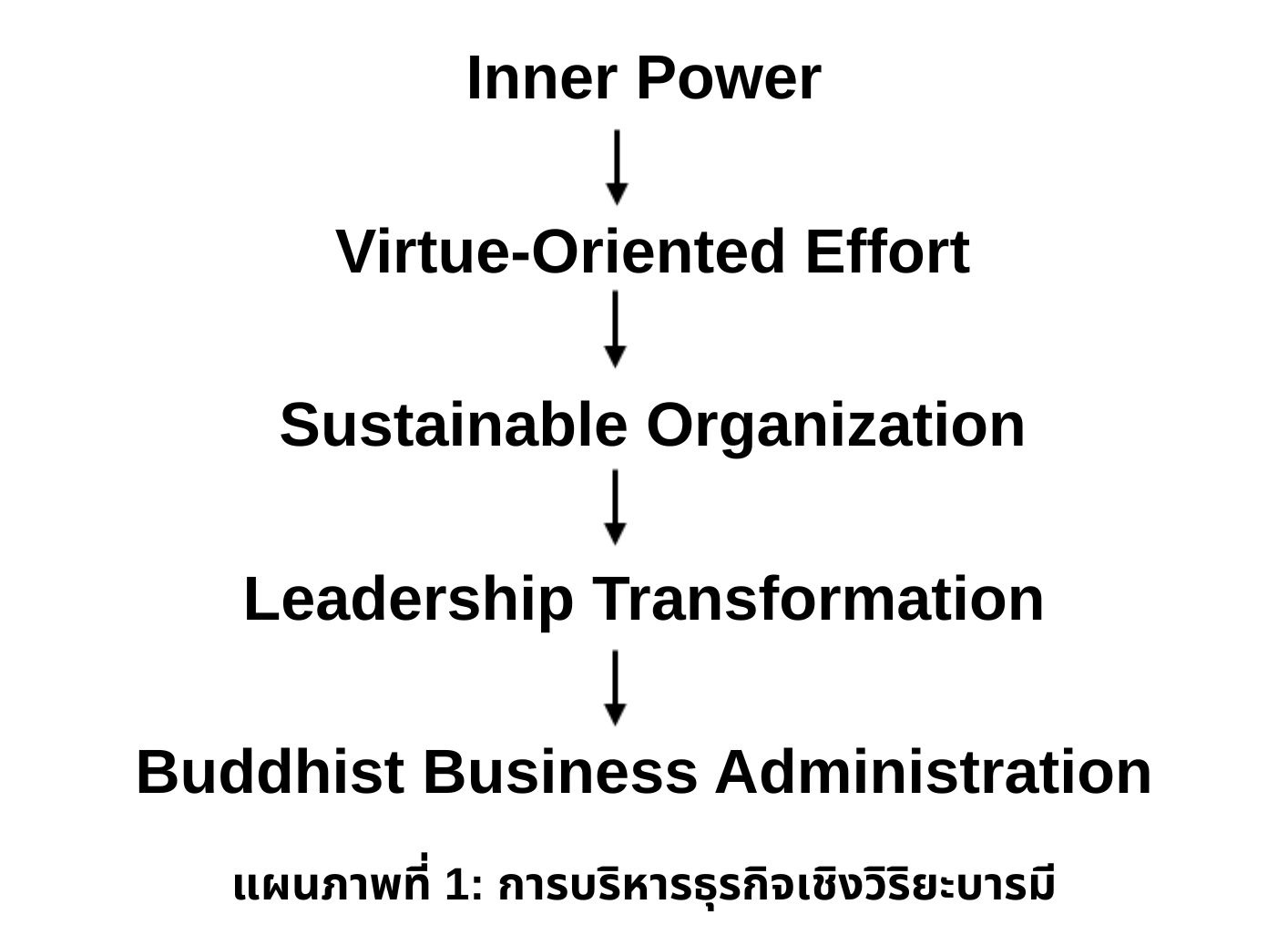การบริหารธุรกิจบนพื้นฐานของวิริยะบารมี
คำสำคัญ:
วิริยะบารมี, การบริหารธุรกิจ, พุทธศาสนาบทคัดย่อ
บทความวิชาการนี้มีวัตถุประสงค์เพื่อศึกษาและวิเคราะห์การบริหารธุรกิจบนพื้นฐานของวิริยะบารมี ซึ่งเป็นหนึ่งในบารมี 10 ประการตามพระพุทธศาสนาเถรวาท โดยใช้การศึกษาเชิงเอกสาร ผ่านการวิเคราะห์ตำรา งานวิจัย และบทความที่เกี่ยวข้อง รวมทั้งการตีความเชิงพุทธปรัชญา เพื่อนำเสนอแนวทางการประยุกต์ใช้ในการบริหารธุรกิจ เพื่อตอบโจทย์ความท้าทายในโลกยุค VUCA ที่เต็มไปด้วยความไม่แน่นอนและการแข่งขันสูง จากการวิเคราะห์ พบว่า การประยุกต์ใช้วิริยะบารมีสามารถเสริมสร้างพลังภายใน ให้แก่บุคลากรและองค์กร ส่งผลต่อการสร้างความยืดหยุ่น และความสามารถในการฟื้นตัวจากวิกฤติ นอกจากนี้ยังช่วยยกระดับความหมายของการบริหารธุรกิจจากการแสวงหากำไรเพียงอย่างเดียว ไปสู่การสร้างคุณค่า และความยั่งยืนที่สอดคล้องกับแนวคิดการพัฒนาที่ยั่งยืน และการพัฒนาภายใน องค์ความรู้ใหม่ที่เกิดขึ้นสามารถสรุปเป็นการบริหารธุรกิจเชิงวิริยะบารมี ซึ่งประกอบด้วย 5 องค์ประกอบ ได้แก่ พลังภายใน ความเพียรเชิงคุณธรรม องค์กรยั่งยืน การเปลี่ยนผ่านภาวะผู้นำ และการบริหารธุรกิจเชิงพุทธปรัชญา
เอกสารอ้างอิง
ชวัลวิทย์ อรุณปราการ, นวลวรรณ พูลวสุพลฉัตร และสรวิชญ์ วงษ์สอาด. (2565). การใช้บารมี 10 ในการพัฒนาตนเองและสังคม. วารสารนวัตกรรมการจัดการศึกษาและการวิจัย, 4(1), 49-56.
พระมหาสมศักดิ์ ญาณโพโธ และ ธานี สุวรรณประทีป. (2560). แนวทางการเสริมสร้างวิริยะบารมีแก่เยาวชนไทยในสังคมปัจจุบัน. วารสาร มจร บาฬีศึกษาพุทธโฆสปริทรรศน์, 3(1), 69–81.
พุทธชญานันท์ จันทร์โสม. (2558). ศึกษาวิเคราะห์พัฒนาการบำเพ็ญบารมีในพระพุทธศาสนาเถรวาท. ปริญญาพุทธศาสตรดุษฎีบัณฑิต. บัณฑิตวิทยาลัย: มหาวิทยาลัยมหาจุฬาลงกรณราชวิทยาลัย.
เอกชัย อุไรสินธ์. (2564). แนวปฏิบัติตามปฏิปทาของพระโพธิสัตว์ในสังคมไทยปัจจุบัน. วิทยานิพนธ์ศิลปศาสตรมหาบัณฑิต. คณะศิลปศาสตร์: มหาวิทยาลัยธรรมศาสตร์.
Carroll, A. B., & Brown, J. A. (2018). Corporate social responsibility: A review of current concepts, research, and issues. Business & Society, 57(1), 7–23.
Drucker, P. F. (1974). Management: Tasks, responsibilities, practices. New York: Harper Business.
Duckworth, A. L. (2016). Grit: The Power of Passion and Perseverance. New York: Simon and Schuster.
Fayol, H. (1949). General and Industrial Management. Sir Isaac Pitman & Sons.
Fiedler, F.E. (1967). A Theory of Leadership Effectiveness. New York: McGraw-Hill.
Harvey, P. (2013). An introduction to Buddhism: Teachings, history and practices (2nd ed.). New York: Cambridge University Press.
Inner Development Goals. (2023). About the Inner Development Goals. Retrieved from https://innerdevelopmentgoals.org/about/
Kast, F. E., & Rosenzweig, J. E. (1972). General systems theory: Applications for organization and management. Academy of Management Journal, 15(4), 447–465.
Lampong, D. (2023). Business administration and ethics in the ASEAN context. Vietnam: ASEAN Academic Press.
Mayo, E. (1933). The human problems of an industrial civilization. New York: Macmillan.
Mintzberg, H. (2009). Managing. San Francisco, CA: Berrett-Koehler Publishers.
Nanamoli, B., & Bodhi, B. (1995). The Middle Length Discourses of the Buddha. A Translation of the Majjhima Nikaya. Canada: Wisdom Publications.
Nassè, T. B., Nangpiire, C., & Linda, G. (2024). The effect of business ethics and corporate social responsibility on business success: Insights from Ghana. Advances in Consumer Research, 1(1), 1–17.
Payutto, P. A. (1998). Buddhist economics: A middle way for the market place. Buddhadhamma Foundation.
Porter, M. E. (1985). Competitive advantage: Creating and sustaining superior performance. New York: Free Press.
Qirem, I. A. E., et al. (2023). The Impact of Sustainability Accounting on Financial Reporting Quality: Evidence from the Pharmaceutical and Chemical Sectors on the ASE. Journal of Logistics, Informatics and Service Science, 10(4), 62–71. https://doi.org/10.33168/JLISS.2023.0405
Robbins, S. P., & Coulter, M. (2018). Management (14th ed.). London: Pearson.
Samyutta Nikaya, V. (n.d.). Connected Discourses of the Buddha. U.S.: Tipitaka (Pali Canon).
Taylor, F. W. (1911). The principles of scientific management. New York: Harper & Brothers.
Wren, D. A., & Bedeian, A. G. (2009). The evolution of management thought (6th ed.). Hoboken, NJ: Wiley.
Zsolnai, L. (2011). Spirituality and business: An Interdisciplinary Overview. Society and Economy, Akadémiai Kiadó, Hungary, 34(3), 489-514.

ดาวน์โหลด
เผยแพร่แล้ว
รูปแบบการอ้างอิง
ฉบับ
ประเภทบทความ
สัญญาอนุญาต
ลิขสิทธิ์ (c) 2025 วารสารสถาบันพอดี

อนุญาตภายใต้เงื่อนไข Creative Commons Attribution-NonCommercial-NoDerivatives 4.0 International License.



